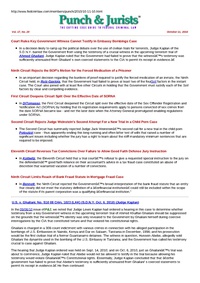This is an important tax fraud decision in which the Eleventh Circuit reversed a number convictions for filing materially false personal income tax returns on the grounds that the district court erred in refusing to give the defendants’ requested special instruction to the jury on their good faith reliance …
Defendants' drug and firearm possession convictions are affirmed where, when a defendant acquires a firearm using drugs as payment, he possesses the firearm in furtherance of a drug trafficking crime in violation of 18 U.S.C. § 924(c)(1)(A).
[Editor's Note: For a commentary on this decision, see "Glock-In-Trade," by Steve …
Non-indictable arrestee brought putative class action pursuant to § 1983 against two jails, alleging strip search violated the Fourth Amendment. After granting motion for class certification, the United States District Court for the District of New Jersey, Joseph J. Rodriguez, J., 595 F.Supp.2d 492, granted arrestee's motion for summary …
Here the Court rejected, by summary order, Judge Weinstein’s second call for a new trial in this child pornography case - thus ending for the most part this long-running and often bitter test of wills that raised a number of significant sentencing issues.
The multi-year battle over the …
In the 09/06/10 issue of P&J, we noted that Judge Lewis Kaplan had ordered a hearing in this case to determine whether testimony from a key Government witness in the upcoming terrorism trial of Ahmed Khalfan Ghailani should be suppressed on the grounds that the witness’s identity was only …
In 2006, Congress enacted the Sex Offender Registration and Notification Act (“SORNA”) to create a national scheme for the registration of convicted sex offenders. SORNA became law on July 27, 2006; but it was not until February 28, 2007, some seven months later, that the Attorney General, acting pursuant …
Here the Court rejected the Government’s broad claim that an entity that did not meet the statutory definition of a “financial institution” under § 1344 could still be included within the scope of the statute if its parent corporation qualified.
This is an interesting decision for those in …
[Editor's Note: For a commentary on this decision, see "Lawyers in the Dock: EDNY Judge Acquits Law Associate of Witness Tampering," by JaneAnne Murray, as posted on the New York Federal Criminal Practice Blog on March 17, 2010 at http://www.nyfederalcriminalpractice.com/2010/03/lawyers-in-the-dock-edny-judge-1.html as follows:
Throwing out the convictions of Robert Simels’ …
Here the Court barred the Government from using the testimony of a crucial witness in the terrorism trial of Ahmed Ghailani because it failed to prove that the witness’s testimony was sufficiently attenuated from Ghailani' s own coerced statements.
In the 09/06/10 issue of P&J, we noted that …
On at least three occasions in the past, the Supreme Court has made it clear that the Government is allowed to medicate a defendant involuntarily for the purpose of rendering him competent to stand trial only in rare circumstances. (See, Washington v. Harper, 494 U.S. 210 (1990); Riggins v. …
